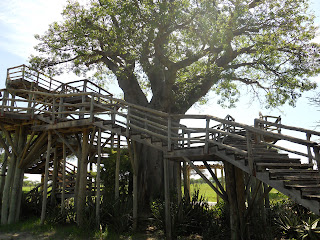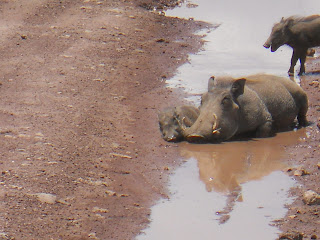“Habari za Safari” actually translates to “How was your vacation?” in Swahili. Thus here in Africa, you can go on safari without it meaning looking at animals from a jeep. I, however, went on a vacation in which I looked at animals from a jeep.
When you’re living in a country like Tanzania, every now and then you get what I like to call “3rd-world’ed out”— frustrated with the living conditions. I don’t say that meaning to sound spoiled; it’s just inevitable. The majority of my safari weekend was awesome and exciting, though I had to deal with some serious third world headaches at times. Looking back, some things were my fault for not being prepared and some things that were not so funny at the time are now hilarious.
I started out by waking up too late on the Friday I left, thanks in large part to a barbecue hosted by one of our English teachers the night before. I was due at my bus at 6:00 AM and it was to pick me up at the Impala hotel down the street from school. I got there at about 6:07, and it had just left. I considered running into town where the bus was idling until 6:30, but I wouldn’t have made it. At about 6:15 I called a taxi, but they wouldn’t have been able to be there for another 20 minutes. The next bus to Arusha (where my safari was departing from) would not be until 11:30. I managed to flag down a man driving an SUV and his son, and they gave me a lift. We pulled up to the bus right as it started to move down the street and thankfully they let me on. As I boarded I noticed Rosemary, one of the teachers at ISM who is from Kenya and was on the way to Nairobi to visit family for the long weekend. “Did you get on just now?” “No, I got picked up at ISM,” she said. “They’ll pick you up at school?” I asked.“Yes, if you tell them ahead of time.” I spent the following five minutes cursing under my breath and receiving looks from the other passengers. Eventually, I moved on.
There had been a bit of a problem with money leading up to the safari. I ended up switching dates a little late, so once I got everything finalized, I received word that the company wanted me to do a wire transfer. Just like everywhere else in Tanzania, they do not take credit cards. This was only 3 days before I was to leave. I looked at my wells fargo online statements and could not figure it out. I went to the bank in Moshi in which the safari company had an account set up, and they could not figure out how to do the transfer either. Finally, I went on a colleague’s fancy google phone and called Wells Fargo, who told me that I would have to come into a branch and set up the international transfer function. That’s going to be a problem, I said—I’m in Africa. I called the company and told them the situation, and they said it was not ideal, but it would have to do. I would have to pull out roughly 2,200,000 Tanzanian shillings from the ATM.
Fast-forward to a couple days later and I am arriving in Arusha, 8:00 AM. I meet Fred in the hotel parking lot, my guide. He’s early 40s, speaks pretty decent English, tells good stories and has a very infectious laugh. I explain to him that before we get going, we have to go to the ATM so I can pay the company. He agrees and we head to the nearest Barclay’s bank. I get out 400,000 shillings—the max per ATM transaction. I put the card back in and go for it again. “Insufficient Funds”. I’m thinking that’s impossible. Especially considering Barclay’s has this advertising campaign that’s like “You can get out 1,000,000 Shillings!” which is followed up with instructions on how to do so: “Insert card. Take out 400,000 shillings. Re-insert card. Take out 400,000 shillings. Re-insert card. Take out 200,000 shillings.”
I decide to try another ATM—Insufficient Funds. Next one says the same thing. I proceed to go 0 for 6 on the next string of nearby ATMs. At first the insufficient funds thing worries me, but I get out a receipt and see that both savings and checking are looking healthy at around 4,000,000 shillings apiece. That’s great and everything, but I have only about 15% of the money I owe for the safari with the 400,000 shillings. I call Hagai (safari owner, Israeli) back and tell him what’s up. He is less than thrilled. We meet on the side of the road; I feel like a complete schmuck and let him know that if he wants to send me back to Moshi, he’s more than welcome to. No can do, he says—everything’s already paid for. After I apologize and sweat for about three minutes straight, he sends us on our way.
Fred and I get to Tarangire at 10:30 am. The first thing of note there are the baobab trees—the thickest trees I have ever seen. According to Fred, some of these trees are over 1,000 year old. Nuts.
I could tell that Fred was unsatisfied with the first hour of the game drive; we saw a big pack of impalas, a few ostriches and my favorite, warthogs. Personally, I found the warthogs hilarious. They all have long mohawks that stretch from their head all the way down their back and a set of horns near their snout that are comparable to a thick white Rollie Fingers moustache. Also, they constantly headbutted each other, and I consistently guffawed at it. Easily amused, I guess.
Tarangire National Park is well-known for its elephant population. Over the course of the day, I saw at least 200 elephants. It’s kind of insane how enormous they are when you are up close. I’ll let the pictures tell it. Also at Tarangire was an enormous troop of baboons at least fifty primates deep.
That night I stayed at the Tarangire Safari Lodge in a giant platform tent with two beds (I pushed them together) and a shower (I took one). The lodge sits on a ridge above the cliff and the view of Tarangire is just bananas. I could step out of my tent, take a few steps and look down onto multiple families of elephants 100 yards under me. It looked good at sundown but even better at sunrise…I got up at that time because I forgot to change the alarm from the previous morning. It ended up being a good thing. Again, I’ll let the pictures tell it.
Day 2 started with a successful trip to the ATM (‘’oh, hell yeah!’’ as my father would say). We then started on the ascent towards Ngorongoro Crater. This was at one time a volcano; essentially, the lava built up and the whole thing collapsed onto itself. There is a large rim circling the crater, so in order to get to it, you have to ascend and then descend. Because of the abundance of vegetation, there are loads upon loads of animal species, most prevalent of which are zebras and wildebeests. We got to see one cheetah from afar (very rare) and five lions including two males (more rare than females). I spied the cheetah for about ten minutes through the binoculars and it was being pretty stagnant. I let Fred look for a few minutes and said ‘’You know who I bet is being hilarious right now? Some warthogs.’’
Towards the end of our time at the crater, I fell asleep. To be honest, safaris take a lot out of you. Each game drive is around 5+ hours in a hot car. In fact, I ended up with an outrageous left arm sunburn from dangling it out of the passenger (backwards from America, remember) side window.
The final day was at Lake Manyara, renowned for its blue monkey and hippo population. I had, in my haste, forgotten my camera battery charger at home Friday morning. However, it managed to last all the way up until the final 45 minutes at Lake Manayara—a pre-Hanukkah miracle, perhaps? Though they were far away, I got a little bit of decent hippo footage and took my favorite video, a troop of about 50 baboons, 1 by 1, jumping over a small puddle rather than simply walking around it.
I was supposed to stay in Arusha Sunday night, but I was far too cashed, so I hopped a bus to Moshi and made a plan to deliver Hagai the remaining balance via a teacher that works at both our ISM campus and our ISM-Arusha campuses. I got on the bus at 5:00 and paid around $2 for the ride that would be around 1.5 hours, in theory. Not so much in practice. We stopped several times on the side of the road to fill the 18-capacity bus to around 40 people, until around 3 or 4 people were actually hanging onto the side. We had four separate breakdowns until the driver and his crew realized the issue. They had run out of gas. After much deliberation, body odor and a couple of crying babies coming to grips with the situation, they managed to start the car up long enough to get us to a gas station. We got in around 7:30 and I grabbed a cab home to ISM, a good hour later than I expected to return.
Gotta love the 3rd world sometimes, yeah?





